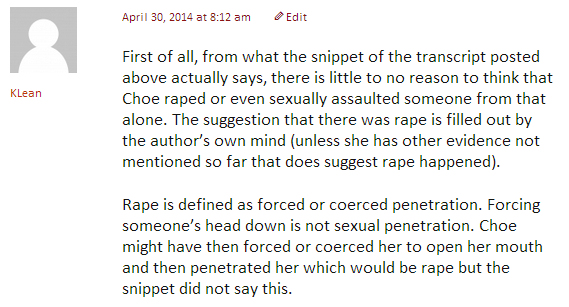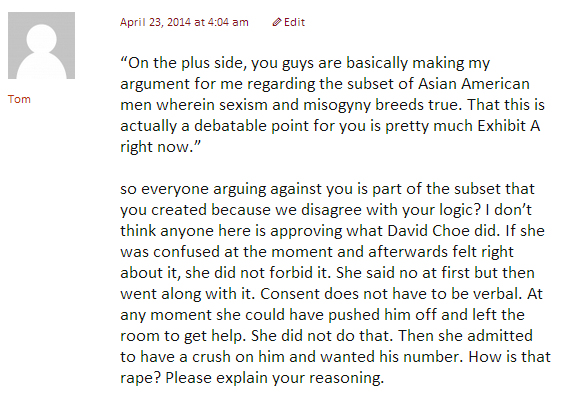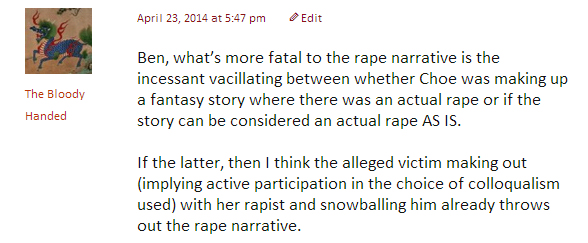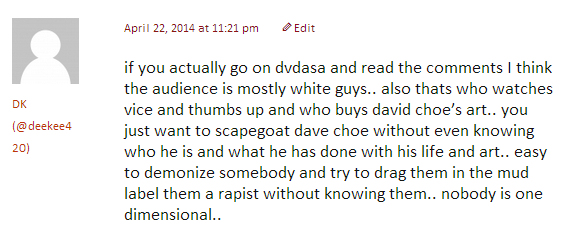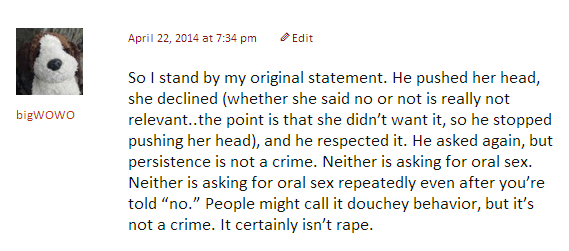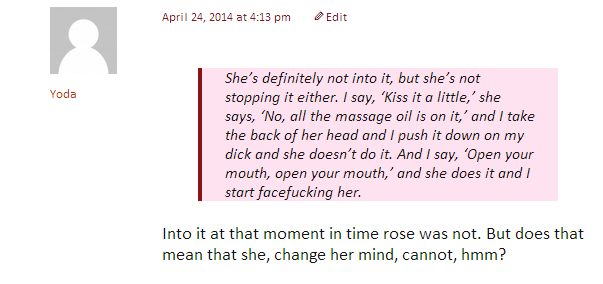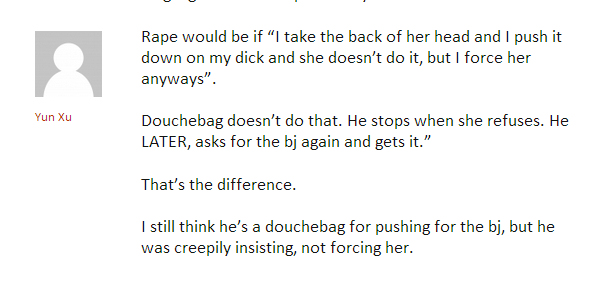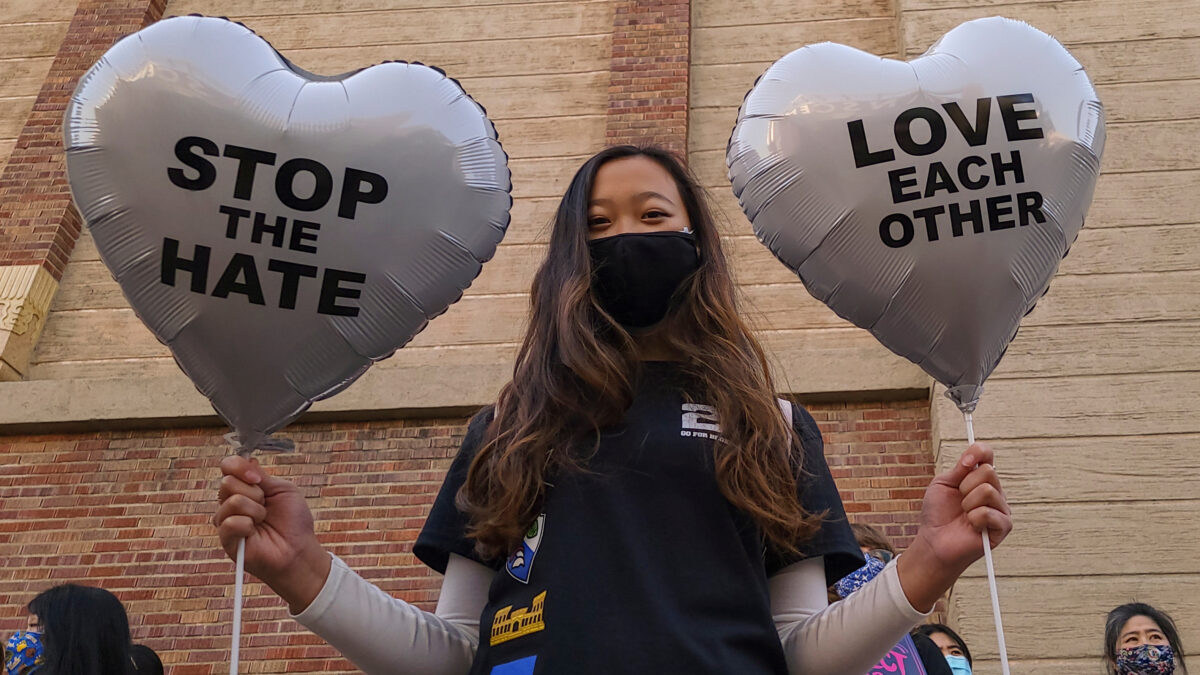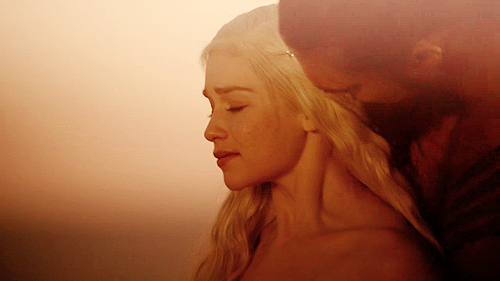
It’s poignant that on the start of this year’s Sexual Assault Awareness Month (SAAM), I wrote a post about the unseen sexual violence in the Asian American and Pacific Islander (AAPI) community; and, as SAAM draws to a close this year, I find myself compelled to write this post about our culture’s twisted ideas about rape and rapists, and how it obscures and excuses high rates of sexual violence within our community by masking our understanding of what rape is.
Nearly two weeks ago, I wrote about Korean American graffiti artist David Choe, who in a March 10th episode of his raunchy podcast DVDASA confessed to an incident that sounded very much like rape. That post quickly became my site’s most popular post to-date and received an overwhelming amount of positive feedback through Twitter and Facebook, as men and women of all races and ethnicities weighed in with their own condemnation of Choe and his self-professed coercion of a sexual act.
https://twitter.com/jambajooce/status/458698728455426050
@reappropriate THANK YOU!! I didn't have enough characters to say how great your article was.
— ThreadsOfCompassion (@knitforwomen) April 28, 2014
https://twitter.com/Luann_Algoso/status/458659954246029312
Cosign @reappropriate on #DavidChoe: Rape is vile; bragging on it is sick in a way that retraction doesn't cover. http://t.co/4SivZR0NxO
— Jeff Yang ? FOLLOW ME @ORIGINALSPIN ON THREADS/IG (@originalspin) April 22, 2014
https://twitter.com/dnkboston/status/458644939870851072
Even after Choe confessed that the act — one he described as “rapey” although he maintains he is not a “rapist” — was fictional, writers debated whether an aspirational story about rape (real or not) could nonetheless be damaging to rape survivors. Feminists maintained that a tale that brags about rape, itself, reinforced “rape culture”: the normalization of sexual violence that both condones and minimizes rape.
My own post on Choe’s behaviour sparked a comment thread that now includes nearly 200 responses; and in contrast to the majority of supportive comments I received through social media, my comments thread has been flooded with (predominantly Asian American and predominantly male) commenters, litigating whether or not Choe’s described story, if taken to be a true account of the events of the night, actually describes an act of rape or not. These commenters accuse me of inventing a “rape narrative” unsupported by the account of the evening, and instead argue that the described event was an act of uncoerced, consensual sex.
So, let me be clear: the act, if it happened exactly as described, was an act of rape. It was not an act of uncoerced, consensual sex. Period.
Here’s what we know happened according to Choe’s own words in the podcast: Choe arrived for a massage and became sexually aroused. He began to masturbate himself. The masseuse, “Rose”, continues the massage. Choe gropes her ass. “Rose” moves away. Choe asks for her to masturbate him. “Rose” refuses. Choe asks again. “Rose” puts her hand on his penis, but barely moves it. Choe grabs her hand with both of his and moves it vigorously. Choe asks “Rose” for oral sex. “Rose” refuses. Choe asks again. “Rose” says no again. Choe grabs the back of her head with both of his hands and pushes it to his crotch. He holds her head there commanding her to open her mouth; when she does, he puts his penis in her mouth and “face-fucks” her until he ejaculates.
Rape, according to California state law, is “an act of sexual intercourse accomplished with a person not the spouse of the perpetrator … where it is accomplished against a person’s will by means of force, violence, duress, menace, or fear of immediate and unlawful bodily injury on the person or another.” Duress refers to “direct or implied threat of force, violence, danger or retribution”. Menace refers basically to any communicated threat or intent of the same.
So, translating the legalese: rape is an act of sexual intercourse performed against a person’s stated will accompanied with physical force or threat of violence.
By Choe’s own admission, “Rose” refused to consent to oral sex not once but twice immediately prior to having her head grabbed. There can be no mistake about “Rose’s” will: she verbalized “no” between two and four times prior to the act of oral sex. By any definition, “Rose” was not a consenting sexual partner.
Yet, Choe ignored the fact that he did not have “Rose’s” consent to continue with sex; instead, he used physical force to restrain her head against his crotch and verbally browbeat her into opening her mouth. At this point, he has engaged in physical force despite “Rose’s” explicit verbal refusal. This use of force with knowledge that consent has not been given, and the reasonable implication that additional force will be used if “Rose” refuses to open her mouth, meets California’s legal definition of rape.
Put more simply: Every time, Choe makes a sexual advance, “Rose” signals that she is reluctant or not consenting. And, every time, Choe ignores the fact that he has not received consent, and continues his advances with greater and coercive force anyways. That he made physical sexual advances towards “Rose” against her stated will is sexual assault; that he coerced oral sex against against her stated will is rape. Despite our protestations, this incident bears all the hallmarks of rape.
Yet, for some, Choe’s acts do not rise to the level of rape; to examine why is telling. For some, it is unclear that Choe holding “Rose’s” head by both hands and pushing it towards his groin is an act of coercion of restraint.
For others, “Rose’s” act of opening her mouth while having her head pushed into place by Choe signals final consent.
For still others, “Rose’s” behaviour subsequent to her rape — failing to run away or fight back; instead asking for Choe’s number, etc — is evidence of retrograde consent: “she must have enjoyed it by the end, so what happened earlier wasn’t rape”.
In a recent episode of Game of Thrones, a scene between Jaime Lannister and sister Cersei also raised eyebrows when (spoiler) Jaime, sexually and physically frustrated after his sister and lover spurns his sexual advances, forces himself onto Cersei while their son, Joffrey, lies in state. Cersei repeatedly says “no”, and even tries to fight Jaime off with her fists; nonetheless, Jaime persists in his sexual advances and what results is a scene of rape. Yet, despite this scene presenting all the hallmarks of coerced, unconsensual sex, several of those responsible for the scene — from the director to the actor who plays Jaime Lannister — insisted that the scene was consensual; director Alex Graves went so far as to remark that the sex scene wasn’t rape because it was “consensual by the end”.
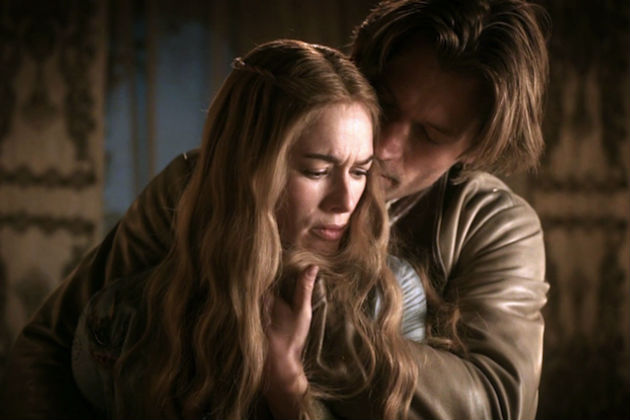
And so we arrive at the crux of the matter. Whereas our definitions of rape and sexual assault are actually quite straightforward — making continued, and often increasingly forceful, advances towards the end-goal of sexual intercourse in knowing violation of your partner’s communicated refusal to grant consent — our culture nonetheless has a very twisted, very bizarre definition of what rape actually looks like.
We seem to know what rape is, but we don’t recognize it when we see it.
Instead, we imagine rape is violent. We visualize rape as happening to a chaste young girl walking down a dark alley. We assert that a rapist is an older man, unshaven and smelling sourly of sweat and dirt, wielding a knife or maybe a gun. He’s a loser and a social reject; he clearly can’t get a date any other way. She’s beautiful and out of his league. Maybe she’s wearing a skirt. He jumps out, and surprises her. He forces himself upon her. She screams, tries to fight back, but is overpowered. She survives with bruises. He flees into the night and she stumbles away, her pantyhose torn, to give tearful testimony to Mariska Hargitay and Ice-T.
If a scene doesn’t look like this, it’s not rape.
Rape doesn’t happen to people we know. Rape doesn’t happen between people who know each other. Rape survivors are not our friends, our sisters, ourselves. Rapists are not our friends, our brothers, ourselves.
Rape is the crime of a few bad actors. Normal people, we assert, cannot be guilty of rape.
And so, even when faced with clear examples of coerced unconsensual sex, some among us continue to deny that a rape took place because the scene presented does not meet this narrow, scripted Law & Order fantasy of what rape looks like. We have trouble recognizing rape between Jaime and Cersei Lannister because it happened between lovers. We have trouble recognizing rape between David Choe and “Rose” because Choe did not apply what we believe to be the requisite force to physically overpower his partner. We have trouble recognizing rape between Khal Drogo and Daenerys Targaryen because Daenerys did not fight back. Never mind that in none of these examples of sex did the female partner articulate any sort of consent; consent (or the lack thereof), it seems, is functionally less critical to our idea of what constitutes rape than is the violence. If we don’t see sufficient force — blood, bruises and tears — we imagine therefore that a woman’s failure to physically defend herself must mean that she wanted the sex, or at least that she didn’t “not want” it enough for it to be rape.
Consent, in fact, is so malleable in our minds that an act of rape can become “not-rape” after-the-fact. Nonconsensual sex can, as Graves argued with Game of Thrones and as others argue on my blog, “become consensual by the end”. Just rape her enough and she’ll like it enough to erase the fact of the rape.
This idea of “consensual by the end” hinges upon a more fundamental fallacy. Rape, we imagine, is a violation of the “no-that-actually-means-no”. That “no-that-actually-means-no” is obvious and discernible, we insist. In fact, Choe admits that had “Rose” threatened to call security, he would have stopped — a clear indication that he understood that there was some version of “no” that was inviolate.
By contrast, he and others who fail to see rape in the examples provided above assert that there is a second kind of “no”: the mythical “maybe-no”. This is the “maybe-no” that doesn’t actually mean “no”. This is the “maybe-no” that can be safely ignored, or if violated, does not constitute rape. This is the “maybe-no” that leaves wiggle room for men to pry into a “yes”. This is the “maybe-no” that can be battered into “consent by the end” with increasingly aggressive non-consensual sexual advances. This is the “maybe-no” that rationalizes coercion or force, because this is the “maybe-no” uttered by a woman who actually doesn’t know what she really wants. This was the “maybe-no” uttered by Cersei Lannister and “Rose” that refutes their rape. This was the “maybe-no” that with enough persistence can become “yes” by the end, and thereby nullify all the non-consensual things you did to get there.
Consider for a minute the hubris of the “maybe-no”: according to this mythology, a woman utters this “no” because she thinks she doesn’t want sex. But, force her mouth onto your oil-soaked penis in all its erect glory (as does Choe) or penetrate her against her will (as does Jaime), and she becomes so overwhelmed by your virility that she realizes that she wanted it all along. “Rose” didn’t want to give Choe oral sex until he literally forced her face into his crotch; and then suddenly she was so compelled by how great his dick looked or smelled and how strongly he was restraining her by the back of her head that she realized she was wrong all along and then gave him retroactive consent for all the violations of her will along the way to her sudden sexual epiphany. The “maybe-no”, it is asserted, can be shattered by simply demonstrating to your partner (against her will) how awesome your penis is. Because you know better than she does what she’s turning down. Once she tries it, she’ll change her mind. Once she gets a taste, she can’t possibly refuse.
In short, the “maybe-no” is not considered to be a true lack of consent. It’s considered a speed bump towards sex, to be ignored and overrun by the “I’m-not-a-rapist rapist”. The rapist who achieves the mythical “consent by the end” is not chastised for the rape that comes with having violated his partner’s consent with increasingly forceful sexual advances against her will, he is instead praised for his “persistence” in not taking “no” for an answer. The continuous assertion of the existence of the “maybe-no” in our society doesn’t just excuse or minimize rape, it actually encourages the repeated violation of vocalized refusals in pursuit of the “consent by the end”. Just keep “insisting” and she’ll give you consent eventually.
And in this mythology, what is the difference between the “maybe-no” that rewards persistence and the “no-that-actually-means-no” that is a bridge too far? The difference is in the “eyes”, says Choe, or in a “gut feeling”. Hearing your partner uttering the word “no” becomes less important than if you choose to believe it or respect it for what it is. You can tell the difference between the “maybe-no” and the “no-that-actually-means-no”, goes the mythology, even if the words are exactly the same.
Thus, we arrive at full comprehension of society’s twisted definition of rape as an act that only occurs between a crazed loser and his victim, in dark alleys; a crime that only involves the violation of the “no-that-actually-means-no” that we all understand signals rape. We tell ourselves that rape does not occur between lovers, that rape is never anything but the most violent and forceful of acts, that rape never involves a victim who is too terrified to fight back tooth and nail. Rape doesn’t happen to you. You’re not a rapist because you’re a good person.
And therefore, if she’s saying “no”, she must be saying “maybe-no” because she doesn’t really know what she wants and anyways you could tell if she really meant “no”. Instead, she’s saying “maybe-no” because she needs you to show her what she really wants. You know her sexual desires better than she does. If you violate her consent now, she’ll love what you’re giving her so much she’ll forget that she refused you before.
Rape her enough and she’ll say “yes”, and then it won’t be rape anymore.
And so you’re left with David Choe and his twisted idea of how to compel a sex act without it really being rape: “you never ask first, you just do it, get in trouble and then pay the price later.” Sure it’s “rapey”, says Choe, but Choe’s not a “rapist”. He’s a good guy and she didn’t act like a rape victim is scripted to act on TV, so it wasn’t rape. It was “consensual by the end”. It was “persistence”.
But here’s the truth: all of these intellectual twists are really ways to muddy the waters around the otherwise very straightforward concept of consent. Consent is a binary: you either have it or you don’t. There is no such thing as “maybe-no”; it was invented by people who wanted to build a back-door to sex in the face of a verbalized “no”.
On the other hand, to respect one’s sexual partner is to respect that your gut doesn’t know better than your sexual partner what he or she wants. To respect one’s sexual partner is to hear “no” and to actually hear “no”. To not rape your partner is to not force your way towards sex, but to instead ask for consent every step of the way. And yes, that means being comfortable and confident enough accept being turned down for sex as a valid possible outcome.
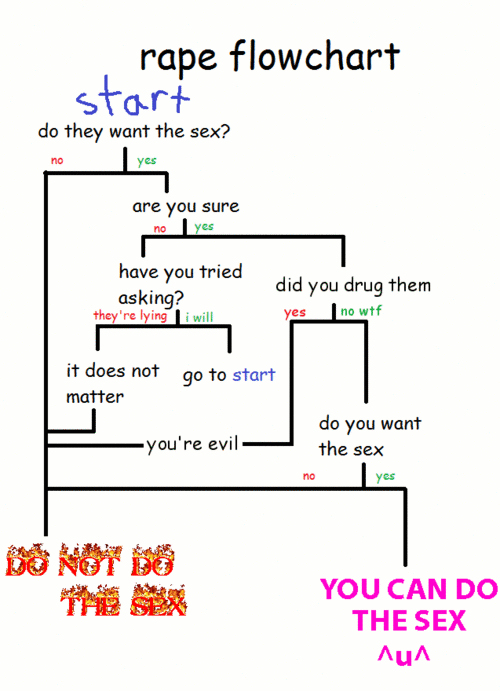
Women should not be held to a standard of needing to prove she means “no”. Requiring that a woman claw, scratch, or threaten to call the cops in order for her “no” to bear weight requires that a woman assert her power in a rape situation where power is being progressively, and deliberately, removed from her. Telling a woman that she must prove that she means “no” argues that her right to refuse sex is not an innate right; it must instead be demonstrated. Expecting a woman to fight back when she has already had it proven to her that her would-be rapist is more physically powerful than her, and is willing to use that strength to compel a sex act, before we will accept that a woman actually means “no” when she says “no” is unreasonable. Her word should be enough.
So here’s the pro-tip: If you hear “no”, stop and ask for clarification. Play it safe and check in with your partner. Don’t play by Choe’s rules and “do it first and pay the price later”; the price if you’re wrong is the sexual violation of your partner. If your partner says “no” or seems like they don’t want it, just don’t do it. It really is just that simple.
And really, people. Stop excusing rape, in yourself and in others.
Note: This post has highlighted some troublesome comments from my blog to serve as examples in this post, but should not be interpreted as asserting that the writers of those comments condone rape when they recognize it as such; most do not. Additionally, as with my previous post, David Choe is an alleged rapist who maintains that his story is pure fiction, and should be treated as such.

